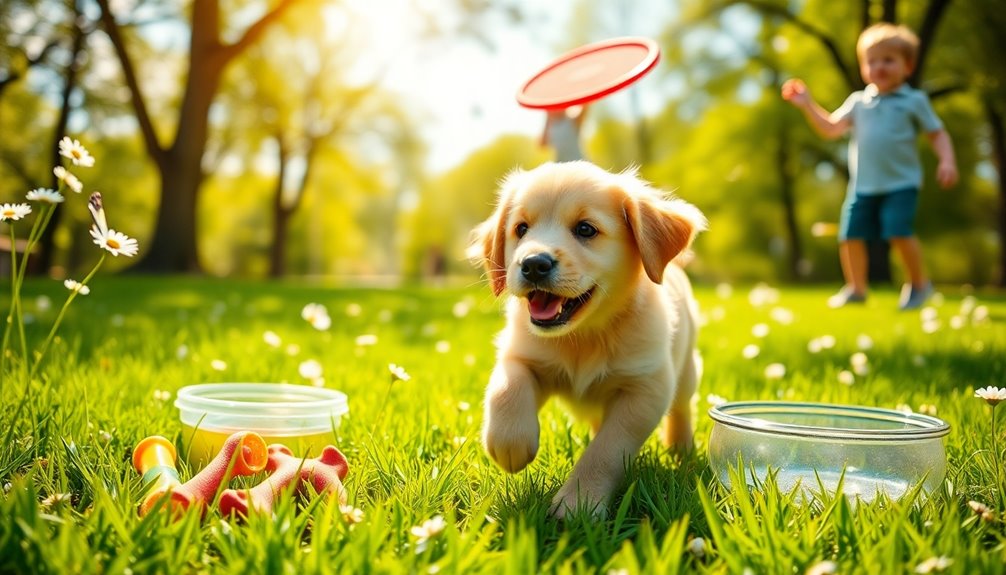Understanding your puppy’s growth stages is key to giving the right care at each phase. As they develop, you’ll notice milestones like teething, socialization, and learning to walk confidently. Recognizing these signs helps you support their health and happiness while catching any concerns early. By paying attention to their evolving needs and adjusting your approach, you’ll set a strong foundation for their lifelong well-being. Keep exploring to learn how to navigate each stage successfully.
Key Takeaways
- Recognize developmental milestones to tailor care and ensure healthy growth.
- Track growth stages to monitor physical and behavioral progress.
- Proper nutrition supports each growth phase and prevents health issues.
- Early socialization enhances confidence and reduces fearfulness during critical periods.
- Adjust environment and care strategies based on your puppy’s evolving needs.

Understanding your puppy’s growth stages is essential for providing the right care at each phase. As your puppy develops, their needs change rapidly, and recognizing these milestones helps you support their health and happiness. One of the most critical aspects during these early months is puppy nutrition. Proper nutrition fuels growth, supports their immune system, and lays the foundation for healthy development. You’ll want to choose a high-quality puppy food that’s formulated for their specific age and breed, ensuring they get the right balance of protein, fats, and essential nutrients. Feeding your puppy on a consistent schedule and monitoring portion sizes helps prevent overfeeding or undernutrition, both of which can cause long-term health issues. As they grow, you might notice their appetite fluctuates, and adjusting their diet accordingly is key. Consulting your veterinarian can help you make informed choices about shift to adult food when the time comes. Additionally, understanding the importance of growth milestones enables you to better track your puppy’s progress and address any concerns early on.
Socialization techniques are equally crucial during your puppy’s early months. This period is the prime window for social development, and exposing your puppy to various environments, people, and other animals in a positive, controlled manner helps prevent behavioral problems later. Gentle introductions to new sights, sounds, and smells build their confidence and reduce fearfulness. Using positive reinforcement, like treats and praise, encourages your puppy to associate new experiences with good things. Socialization isn’t just about meeting other dogs; it also involves training them to be comfortable around different humans, including children, strangers, and even visitors to your home. Playdates, puppy classes, and supervised outings to parks can be excellent opportunities to practice social skills. Remember, patience is crucial—if your puppy shows signs of fear or stress, give them space and time to adjust. Consistent, positive social interactions during this formative period set the stage for a well-adjusted adult dog.
Understanding these early stages helps you create a nurturing environment tailored to your puppy’s evolving needs. Paying close attention to puppy nutrition guarantees they grow strong and healthy, while effective socialization techniques foster their confidence and social skills. Both aspects require your active involvement, patience, and understanding. By providing the right balance of nourishment and positive experiences, you’re not only helping your puppy reach their developmental milestones but also strengthening the bond you share. Remember, each puppy is unique; observing their responses and adjusting your approach accordingly makes all the difference. With this knowledge, you’ll be better equipped to guide your puppy through their growth stages, setting them up for a lifetime of health, happiness, and good behavior.
Frequently Asked Questions
How Can I Tell if My Puppy’s Growth Is Healthy?
You can tell if your puppy’s growth is healthy by monitoring their weight and body condition regularly. Make certain they’re eating a balanced puppy nutrition plan and staying energetic. Keep up with growth monitoring by tracking their size and milestones. If they seem sluggish, lose weight unexpectedly, or have dull coat or skin issues, consult your vet. Consistent check-ins help confirm your puppy is developing properly and staying healthy.
What Are Common Behavioral Issues During Growth Phases?
During growth phases, you might notice common behavioral issues like teething frustrations, where your puppy chews excessively, and housebreaking challenges, with accidents inside. These behaviors are normal as your puppy explores and learns. Stay patient and consistent with training, offering chew toys for teething and frequent bathroom breaks. Remember, these phases are temporary, and with positive reinforcement, your puppy will develop better habits over time.
How Do I Adjust Feeding as My Puppy Matures?
As your puppy matures, you should adjust its puppy diet and feeding schedule accordingly. Gradually shift to adult food around 12 months, following your vet’s guidance. Increase portion sizes as your puppy grows, but monitor weight and energy levels to prevent overfeeding. Keep feeding times consistent to establish routine, and remember, a balanced diet supports healthy development and helps prevent behavioral issues.
When Should I Start Training and Socialization?
Think of your puppy as a blank canvas waiting to be painted with new experiences. You should start puppy socialization and early training between 7 to 16 weeks, when their curiosity is like a sponge enthusiastic to soak up new sights and sounds. During this window, gentle exposure helps build confidence and good habits, setting the foundation for a well-adjusted dog. Act now to turn your puppy into a social and obedient companion.
What Signs Indicate My Puppy Needs Veterinary Attention?
If your puppy shows signs like persistent vomiting, diarrhea, lethargy, or difficulty breathing, you should seek veterinary attention immediately. Watch for breed-specific concerns, such as breathing issues in small breeds or joint problems in larger ones. Make certain your puppy is up-to-date on puppy vaccinations, as these protect against illnesses. Prompt veterinary care helps address health concerns early and keeps your puppy on the path to healthy growth.
Conclusion
By understanding your puppy’s growth stages, you’ll feel like a guiding star, helping them navigate each milestone with confidence. From tiny paws to wagging tails, every phase is a step toward a happy, healthy adult dog. Remember, their development is like a beautiful sunrise—gradual and full of promise. Stay patient and loving, and you’ll cherish every moment of their journey as they grow into the best companion you could ask for.









